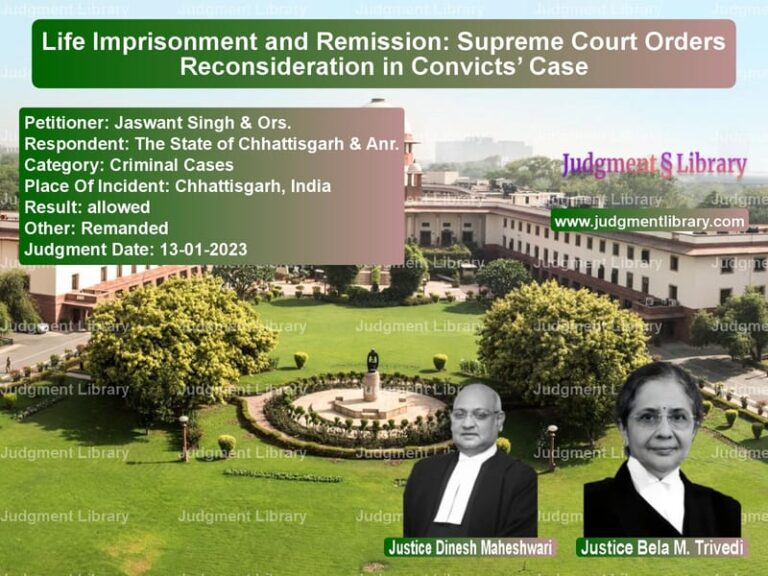Criminal Case Resolution: Apology and Legal Closure in Trespassing and Cheating Case
The case of Neville Dadi Master v. The State of West Bengal & Anr. is a significant example of how legal proceedings can be resolved through mutual understanding and settlement. The case, which originated from allegations of trespassing and cheating, was ultimately dismissed after the accused offered an unqualified apology to the complainant, leading to the closure of the trial.
The case revolved around an FIR filed on August 9, 2017, against the appellant under Sections 419 (Cheating by Personation), 353 (Assault or Criminal Force to Deter Public Servant from Duty), 447 (Criminal Trespass), and 120B (Criminal Conspiracy) of the Indian Penal Code (IPC), along with Section 12 of the Prevention of Corruption Act (P.C. Act). The complaint alleged that the appellant had engaged in fraudulent activities, but after an investigation, charges under Sections 353 and 120B IPC and Section 12 of the P.C. Act were dropped, leaving only Sections 419 and 447.
Background of the Case
The appellant had initially been accused of trespassing and cheating in a matter that resulted in criminal proceedings. However, as the case progressed, the appellant sought to settle the issue by offering an unqualified apology to the complainant, leading to an alternative resolution of the dispute.
After the Special Court framed charges under Sections 419 and 447 of the IPC, the appellant sought to challenge this decision before the Calcutta High Court under Section 482 of the Criminal Procedure Code (Cr.P.C.), which allows the High Court to quash proceedings if deemed necessary to prevent the abuse of the legal process. However, the High Court dismissed the application on January 2, 2023, prompting the appellant to appeal to the Supreme Court.
Petitioner’s Arguments
The appellant’s counsel, Mr. Mukul Rohatgi, presented the following arguments before the Supreme Court:
- The charges under Sections 419 and 447 IPC were compoundable under the law, meaning they could be settled between the parties.
- The appellant was remorseful and wished to tender an unqualified apology to the complainant.
- Since the complainant had agreed to the apology, there was no need to continue the criminal trial.
- It would be unjust to subject the appellant to criminal proceedings when the complainant was satisfied with the resolution.
Respondent’s Arguments
The respondent, represented by Mr. Sanjay Jain, did not oppose the settlement but left the matter to the discretion of the court.
Supreme Court Judgment
The case was heard by Justice S. Ravindra Bhat and Justice Dipankar Datta. The Supreme Court analyzed the nature of the charges and the circumstances of the case before delivering its judgment.
1. The Role of Apology in Criminal Cases
The Supreme Court noted that the appellant had met the complainant and offered an unqualified apology. The complainant, in a report dated March 31, 2023, confirmed being satisfied with the apology and stated that the matter had been resolved.
Read also: https://judgmentlibrary.com/supreme-court-grants-probation-in-gambling-conviction-case/
2. Compoundable Offenses and Legal Precedents
The Court examined whether Sections 419 and 447 IPC were compoundable and found that they could be legally settled between the parties.
“Since Sections 447 and 419 IPC make the offenses compoundable by the person in possession of the property trespassed and cheated, respectively, and given the satisfaction of the complainant, there is no reason to continue the criminal proceedings.”
3. Closure of Criminal Proceedings
The Supreme Court ruled in favor of closing the case, stating:
“Having regard to the special facts and circumstances of this particular case and to give a quietus to the matter, closure of G.R. Case No. 2199 of 2017 which the ACJM is presently seized of against the appellant is warranted.”
4. Warning to the Appellant
The Court issued a caution to the appellant, urging him to avoid similar conduct in the future:
“Before parting, this Court sounds a note of caution for the appellant to be careful in future to avoid recurrence of a similar incident.”
Final Verdict
The Supreme Court allowed the appeal and set aside the previous orders of the Special Court and the Calcutta High Court. The case was officially closed, and the appellant was discharged from the criminal proceedings. The Court also appreciated the complainant’s willingness to resolve the matter:
“After all, ‘to err is human but forgiving is divine.’”
This judgment highlights the importance of settlement mechanisms in the legal system and reinforces the principle that minor disputes, where an apology is accepted, need not always result in prolonged litigation.
Petitioner Name: Neville Dadi Master.Respondent Name: The State of West Bengal & Anr..Judgment By: Justice S. Ravindra Bhat, Justice Dipankar Datta.Place Of Incident: West Bengal.Judgment Date: 19-05-2023.
Don’t miss out on the full details! Download the complete judgment in PDF format below and gain valuable insights instantly!
Download Judgment: neville-dadi-master-vs-the-state-of-west-be-supreme-court-of-india-judgment-dated-19-05-2023.pdf
Directly Download Judgment: Directly download this Judgment
See all petitions in Fraud and Forgery
See all petitions in Theft and Robbery Cases
See all petitions in Judgment by S Ravindra Bhat
See all petitions in Judgment by Dipankar Datta
See all petitions in allowed
See all petitions in Quashed
See all petitions in supreme court of India judgments May 2023
See all petitions in 2023 judgments
See all posts in Criminal Cases Category
See all allowed petitions in Criminal Cases Category
See all Dismissed petitions in Criminal Cases Category
See all partially allowed petitions in Criminal Cases Category







